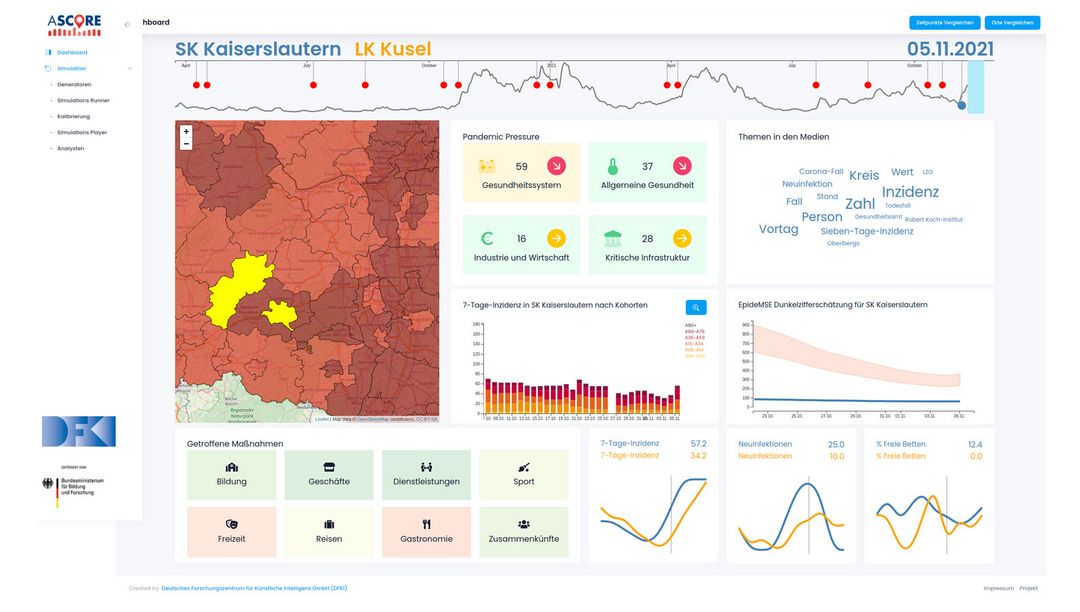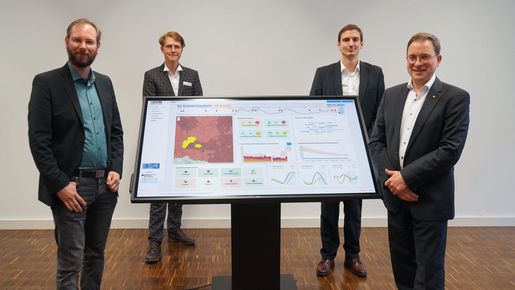On the 25th November 2021, the scientists led by Prof. Dr. Ingo Timm invited project participants, stakeholders and members of the public to the final workshop. They presented the Pandemic Management Cockpit, which provides crisis teams and decision-makers with necessary information on the current state of their community. Ascore was presented in detail to the general public and discussed via livestream from Kaiserslautern.
Local pandemic simulations on a scientific basis
Via an intuitively useable dashboard, AScore aggregates data from different sources and offers the possibility of estimating the impact of specific decisions on contact restrictions using the connected simulation software. The newly introduced Pandemic Pressure Score is particularly important to the value of this project. This score adds non-medical factors to familiar metrics such as incidence and hospitalisation rates and thus sets AScore apart from similar services and tools. In addition to information on the health of the population and the strain on the health system, economic and social burdens such as insolvencies or unemployment are also taken into account to illustrate the overall burden on the population in an intuitively comprehensible way.
Prof. Dr. Ingo Timm, project manager and head of the research field “Cognitive Social Simulation” at the DFKI branch office in Trier, explains the added value of the Pandemic Pressure Score: “During our scientific monitoring of the city administrations of Kaiserslautern and Trier over the course of the pandemic, we learned that a wide range of aspects have to be considered when deciding on interventions. It is essential to maintain an overview and to recognise possible side effects of the pandemic response. It is therefore our task to make decision-relevant information available and accessible as needed by the decisionmakers and to provide them with the tools to analyse data with intelligent methods. With the Pandemic Pressure Score, we can keep the current pandemic situation on our radars.” For this purpose, ASCore provides proven techniques for data representation and analysis developed by the Smart City Living Lab of the DFKI in Kaiserslautern to pandemic management. “We can use these methods to intelligently process data, make it accessible and take local particularites into account when deciding on pandemic response, given that the pandemic does not follow the same patterns of spread everywhere. Thus, in AScore, we connect the cockpit to a simulation component that allows examining and estimating the effects of various pandemic control measures for local conditions,” adds Dr Jan Ole Berndt, who is in charge of the technical implementation of the project.
Ralf Marczoch, Managing Director of the project partner mata:solutions, is familiar with approaches to data-driven crisis management and sees potential in the results of AScore: “We cannot predict the course of crises and disasters in detail, but AScore shows us possible developments and trends in the pandemic, which give us orientation and thus creates a scientific base for decision-makers.”
The AScore cockpit has already been received with much enthusiasm at this year's congress of the Verband für Sicherheitstechnik e.V. (Association for Safety Technology) (VfS) and at the crisis management meetings of the Greater Trier Region. Dr. Clemens Gause, Chairman of the VfS, sums up the project and its potential positively: “The pandemic has been with us for almost two years now, and decisions based on the most up-to-date information are called for again and again. In this context, it is important that the decision-makers have access to correct, well-prepared information that is put into a logical context. That is why AScore is the required step for the security of the future.”
Close cooperation with municipalities
In the summer of 2021, the simulations behind AScore were used to support the decision of the crisis team of the city of Kaiserslautern on the opening of various recreational facilities and simulated how, for example, opening public swimming pools would affect the development of infections. In the current crisis situation, there is often a lack of experience from previous, similar crises, so simulations based on established methods and concepts are a strong scientific base for decision-makers. Therefore, the DFKI at the University of Trier will be working on follow-up projects based on AScore in the coming years. The competences and findings from AScore will help researchers to extend application examples to other crisis situations and to explore alternative AI-based approaches to crisis management. Thus, they will continue to cooperate closely with future users.
Wolfram Leibe, Lord Mayor of the city of Trier, also draws a positive conclusion from the cooperation between the city administration and the DFKI: “AScore makes an important contribution towards building bridges between local government and science. The pandemic underlines the importance of gathering data and information from different sources and offering those involved in local crisis management a holistic picture of the current situation. We hope that the good cooperation between the city administration and the DFKI will inspire closer cooperation between research and administration in the long term, not only in Trier, but also elsewhere.”


